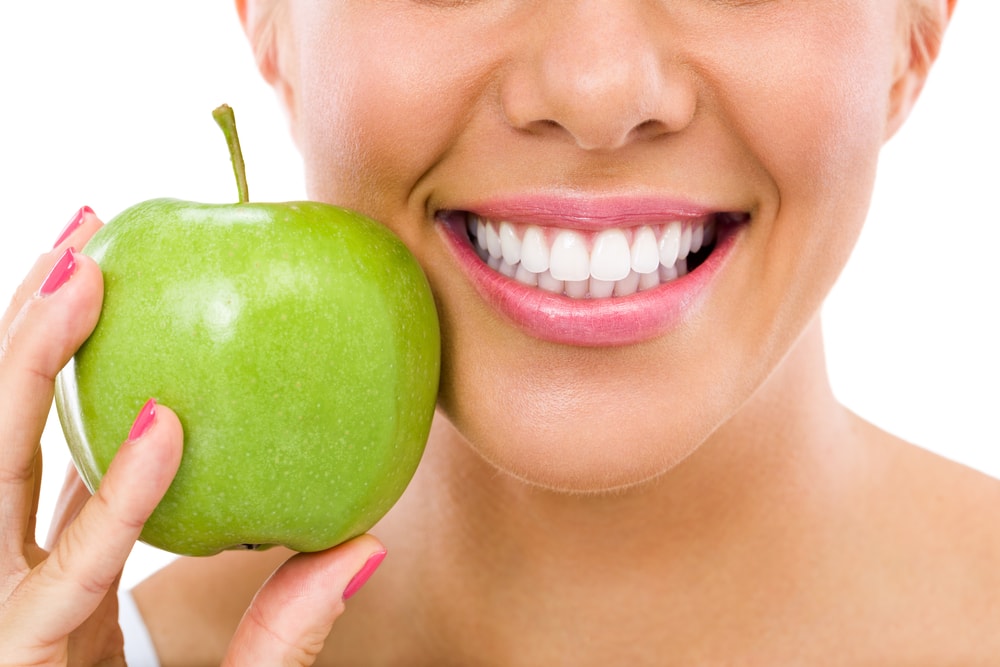Oral health is an integral component of overall well-being, and its maintenance requires a multifaceted approach that goes beyond regular brushing and flossing. One of the often overlooked aspects of oral health is the critical role that nutrition plays in ensuring healthy teeth and gums. The relationship between nutrition and oral health is intricate, with various nutrients, vitamins, and minerals directly influencing the strength of teeth, the resilience of gums, and the overall integrity of the oral cavity. This comprehensive guide will delve into the intricate connection between nutrition and oral health, highlighting the importance of a balanced diet, essential nutrients for oral health, harmful foods to avoid, and the best foods to consume for maintaining optimal oral well-being.
Importance of a Balanced Diet for Oral Health
A balanced diet forms the cornerstone of maintaining excellent oral health. The consumption of a variety of nutrient-dense foods not only promotes overall health but also significantly impacts the strength and vitality of teeth and gums. By incorporating a diverse range of foods that are rich in essential vitamins and minerals, individuals can fortify their oral defence mechanisms and reduce the risk of dental issues.
Nutrients Essential for Healthy Teeth and Gums
Certain nutrients play a pivotal role in fortifying the teeth and gums, ensuring their resilience against various oral diseases. Understanding the significance of these nutrients is crucial for designing a diet that fosters optimal oral health.
Role of Calcium in Dental Health
Calcium stands as one of the primary building blocks for maintaining strong and healthy teeth. Adequate calcium intake promotes the development of robust tooth enamel and helps in preventing dental cavities and decay.
Sources of Calcium-Rich Foods for Strong Teeth
Incorporating calcium-rich foods into your diet is crucial for supporting dental health. Here are some excellent sources of calcium:
- Dairy Products: Milk, yogurt, and cheese are well-known sources of calcium. They also provide casein, a protein that can help strengthen tooth enamel.
- Leafy Greens: Vegetables like kale, spinach, and collard greens are not only rich in calcium but also contain other essential vitamins and minerals that promote oral health.
- Fortified Cereals and Plant-Based Milks: Many cereals and non-dairy milk alternatives are fortified with calcium. Be sure to check the labels for the calcium content.
- Almonds: Almonds are not only a source of calcium but also provide healthy fats and protein, which can benefit overall health.
The Importance of Vitamin D for Oral Health
Vitamin D is instrumental in facilitating the absorption of calcium, consequently aiding in the development and maintenance of strong teeth and bones.
Sunlight and Vitamin D Synthesis in the Body
Exposure to sunlight triggers the synthesis of vitamin D in the skin. Spending time outdoors, especially during the sunnier months, is an excellent way to boost your vitamin D levels. Just a few minutes of sun exposure to your arms, face, and legs a few times a week can provide the necessary vitamin D.
Fatty Fish: A Dietary Source of Vitamin D
Including fatty fish in your diet can also contribute to your vitamin D intake. Fish like salmon, mackerel, and tuna are rich in this essential vitamin.
Harmful Foods for Oral Health
While certain foods are beneficial for oral health, others can have detrimental effects, leading to the erosion of tooth enamel, gum inflammation, and an increased risk of dental caries. Understanding which foods to limit or avoid is crucial for preserving the integrity of the oral cavity.
Sugar and Its Impact on Dental Health
Excessive sugar consumption poses a significant threat to oral health, as it serves as a primary energy source for harmful bacteria in the mouth, leading to the production of acids that contribute to tooth decay and cavities.
Hidden Sugars in Common Foods and Drinks
Being aware of hidden sugars in commonly consumed foods and beverages, such as processed snacks, sugary drinks, and even seemingly healthy items, is imperative in curbing the risk of oral health deterioration.
Acidity and Oral Health
Foods and beverages with high acidity levels can erode tooth enamel over time, leaving teeth vulnerable to decay and sensitivity. Minimizing the intake of acidic foods is essential for preserving optimal oral health.
Acidic Foods and Beverages to Watch Out For
Here are some common acidic culprits to be mindful of:
- Citrus Fruits: Oranges, lemons, and grapefruits are acidic and can soften tooth enamel.
- Fruit Juices: While they may be rich in vitamins, many fruit juices are highly acidic and sugary. Opt for whole fruits instead.
- Soda and Carbonated Beverages: Colas and carbonated drinks are not only acidic but also contain added sugars.
- Vinegar: Vinegar-based dressings and pickled foods are acidic and can contribute to enamel erosion.
The Impact of Lifestyle Habits on Oral Health
In addition to nutrition and hydration, lifestyle habits play a significant role in oral health. Smoking and tobacco use, for instance, are known to have detrimental effects on the oral cavity, leading to a higher risk of gum disease, tooth decay, and even oral cancer. Moreover, excessive alcohol consumption can dry out the mouth and decrease saliva production, creating an environment where harmful bacteria can thrive. Therefore, it is essential to consider these lifestyle factors when striving for optimal oral health. Implementing positive lifestyle changes, such as quitting smoking and moderating alcohol consumption, can complement a nutritious diet and effective oral hygiene practices, further promoting the longevity of oral well-being and overall health. Explore the Dental Hygiene Surrey page to see how we can help you achieve optimal oral health.
Best Foods for Oral Health
While certain foods can pose a threat to oral health, others serve as natural defenders, strengthening teeth, and fortifying gums. Incorporating these foods into one’s diet can significantly contribute to the maintenance of a healthy oral cavity.
The Role of Phosphorus in Tooth Strength
Phosphorus works in conjunction with calcium to promote the development of strong tooth enamel, thereby enhancing the overall structural integrity of teeth.
Foods Rich in Phosphorus for Dental Strength
To ensure you’re getting enough phosphorus, consider including these foods in your diet:
- Fish: Fatty fish like salmon and tuna are excellent sources of phosphorus and provide essential omega-3 fatty acids.
- Poultry: Chicken and turkey are not only rich in phosphorus but also a lean source of protein.
- Dairy Products: Besides calcium, dairy products like milk and cheese provide phosphorus.
- Nuts and Seeds: Almonds, pumpkin seeds, and sunflower seeds contain phosphorus and make for healthy snacks.
The Significance of Vitamin A for Oral Tissues
Vitamin A plays a crucial role in maintaining the health of oral tissues, including the mucous membranes in the mouth and gums. Adequate vitamin A intake contributes to the repair and upkeep of oral tissues, promoting optimal oral health.
Incorporating Vitamin A-rich Foods for Oral Health
Incorporating vitamin A-rich foods into your diet can help support oral tissues and overall health. Consider including these options:
- Carrots: Carrots are well-known for their high vitamin A content. They’re also a crunchy, natural tooth cleaner.
- Sweet Potatoes: These orange-fleshed vegetables are not only a great source of vitamin A but also a nutritious addition to your meals.
- Leafy Greens: Spinach, kale, and Swiss chard provide vitamin A and other essential nutrients that promote oral health.
Benefits of Omega-3 Fatty Acids for Gums
Omega-3 fatty acids possess anti-inflammatory properties that can aid in reducing gum inflammation and promoting gum health. Consuming foods rich in omega-3 fatty acids can play a pivotal role in preventing periodontal diseases and maintaining overall gum well-being.
Omega-3 Supplements and Their Impact on Gum Inflammation
For individuals who may struggle to obtain sufficient omega-3 fatty acids through their diet alone, supplements can serve as an effective means of ensuring optimal intake and promoting gum health.
Link Between Nutrition and Dental Diseases
The intricate connection between nutrition and dental diseases underscores the significance of dietary choices in the prevention and management of various oral health conditions. By understanding the link between nutrition and specific dental ailments, individuals can make informed decisions that contribute to the preservation of their oral well-being.
Effects of Vitamin C Deficiency on Gums
A deficiency in vitamin C can compromise the health of the gums, leading to gum bleeding, inflammation, and in severe cases, scurvy. Incorporating foods rich in vitamin C is vital for maintaining healthy and resilient gums.
Fruits High in Vitamin C for Healthy Gums
Consuming a diverse array of vitamin C-rich fruits, including oranges, strawberries, and kiwis, can help prevent gum diseases and support overall gum health.
Strategies for Maintaining Optimal PH Levels in the Mouth
Maintaining the PH balance in the oral cavity is crucial for preventing the demineralization of tooth enamel and the proliferation of harmful bacteria. Implementing specific strategies can aid in sustaining an optimal PH environment within the mouth.
Utilizing PH-balanced Oral Care Products
Using oral care products that promote a balanced pH level in the mouth can help counteract the effects of acidic foods and beverages, thereby safeguarding tooth enamel and overall oral health.
Comprehensive Oral Health and Nutrition Plans
Integrating a comprehensive oral health and nutrition plan into one’s lifestyle is instrumental in promoting long-term oral well-being. By adopting a holistic approach that combines prudent dietary choices with effective oral hygiene practices, individuals can proactively safeguard their oral health.
Collaborating with Dental Professionals for Personalized Plans
Seeking guidance from dental professionals to create personalized oral health and nutrition plans can empower individuals to make informed decisions that cater to their specific oral health needs and goals.
The Link Between Nutrition and Oral Health: A Holistic Approach
In summary, the integration of a wholesome and nutritionally rich diet serves as a crucial element in the preservation of optimal oral health. By acknowledging the direct influence of various nutrients, vitamins, and minerals on the integrity of teeth and gums, individuals can proactively take charge of their oral well-being. Striving to maintain a balanced diet, while avoiding harmful foods and embracing those that bolster oral health, can significantly reduce the risk of dental diseases and promote a radiant, healthy smile for years to come. Acknowledging the symbiotic relationship between nutrition and oral health serves as a vital step toward fostering a comprehensive approach to overall wellness and longevity.
The Psychological Aspect of Nutrition and Oral Health
Beyond the physical benefits, there is a psychological aspect to the relationship between nutrition and oral health. A healthy smile can boost one’s self-esteem and confidence, positively impacting mental well-being. Choosing nutritious foods and maintaining good oral hygiene can lead to a sense of accomplishment and empowerment, fostering a positive self-image. On the other hand, poor dietary choices and neglecting oral health can result in dental issues, potentially leading to self-esteem issues and social anxiety. Recognizing the emotional and psychological connection between a healthy smile and self-confidence underscores the holistic approach needed for optimal oral health. Therefore, in addition to physical health benefits, the psychological well-being of individuals can be significantly enhanced by embracing a diet that promotes excellent oral health.
Conclusion
Nutrition and oral health share an undeniable bond that significantly impacts the overall well-being of an individual. The intricate relationship between the two highlights the crucial role that a well-balanced diet plays in fortifying the teeth, gums, and the entire oral cavity. From the essential nutrients that support dental strength and gum resilience to the harmful effects of certain foods that contribute to oral health deterioration, the significance of making informed dietary choices cannot be overstated.
In a world where our dietary choices can significantly impact our health, taking proactive steps towards optimal oral health through nutrition is both wise and essential. Embracing a lifestyle that combines prudent nutritional decisions with effective oral hygiene practices is essential to having a healthy, vibrant smile, exuding confidence and radiance. Through the integration of comprehensive knowledge and actionable strategies, individuals can pave the way for a future marked by robust oral health and a captivating smile that reflects their commitment to overall wellness and vitality. In doing so, they not only improve their oral health but also enhance their overall quality of life, ensuring that their smiles remain bright and their well-being remains strong.
Enhance your oral health journey with our latest blog post, “5 Most Important Vitamins and Minerals for Oral Health.” Discover the crucial role of key nutrients, including the impact of vitamin D and essential minerals like calcium and phosphorus on maintaining a vibrant smile. Our comprehensive guide explores the nexus between nutrition and oral well-being, providing valuable insights for a healthier mouth. Dive into the specifics of each vital element to empower your dental care routine. For a deeper understanding of the nutritional foundation for optimal oral health, don’t miss out on the insights shared in this dedicated article. Elevate your smile’s well-being – start your journey here!
Explore our dental clinic Surrey to see how we can help you achieve optimal oral health.






